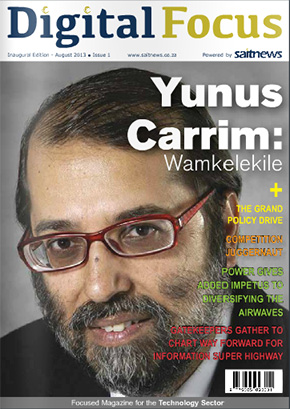Broadband changes people’s lives: Carrim
Broadband changes people’s lives: Carrim
The mobile revolution has brought many benefits of the modern ICT industry to billions of people, says Minister of Communications Yunus Carrim. Speaking at a conference on Broadband held in Stellenbosch recently Carrim highlighted the past twenty years of the development of ICT and specifically for the mobile communications industry.
The mobile revolution has brought many benefits of the modern ICT industry to billions of people. “The next crucial step is to replicate the mobile miracle for broadband in South Africa. Most of our population still have no access to the Internet at all, let alone a broadband connection”.
Carrim says that broadband is not just about high-speed Internet connectivity and accessing more data faster. “Broadband is a set of transformative technologies which is fundamentally changing the way we live – and which has a crucial to play in sustainable economic and social growth”.
The minister added that internet has changed people’s lives. “The Internet has changed the way people live, work, learn and play. The Broadband Commission for Digital Migration report on “Why National Broadband Plans Matter”, done in cooperation with the International Telecommunication Union, and Cisco makes it clear that countries benefit significantly from a Broadband Plan and reinforces the need for us to finalise our Broadband policy in South Africa urgently”.
Carrim adds that research done by the Commission shows that countries with a National Broadband Plan have fixed broadband penetration 8.7% higher and mobile broadband penetration 7.4% higher on average than countries without plans. “The report reveals that competition also plays a crucial role in improving broadband penetration. Competitive markets are linked to broadband penetration levels that are 1.4% higher on average for fixed broadband and up to 26.5% higher on average for mobile broadband. By mid-2013, the report reveals, there were 134 national broadband plans worldwide”.
According to the report, mobile broadband subscriptions in Sri Lanka cost as little $US3 for 3 GB in early 2012. Now just think of that! Compared to in our country….
As government we are also interested in how a Broadband Plan would improve the access of citizens to affordable services. The economic and social benefits of broadband are more likely to be realised when there is strong collaboration between government and industry.
The Broadband Commission for Digital Development has set a number of targets. According to the minister “the targets for 2015 are aimed at making broadband policy universal, reducing costs and increasing access. This includes the target that all countries should have a national broadband plan which should include definitions for universal access or service, and more affordable broadband with entry-level broadband services made available in developing countries through adequate regulation and market forces”.
The minister noted the importance of broadband in all aspects citizen’s lives.” Broadband will contribute to economic and social development by encouraging the adoption of local digital content. This will lead to the development of a National Digitisation Programme which prioritises amongst others, e-health, e-education and e-government services to citizens”.
He added that in education, broadband has the ability to strengthen teaching, learning and administrative processes, transcending many geographical and financial limitations. “The days of carrying a heavy school bag could become a thing of the past as school children merely carry their tablets to class. The Gauteng Government has already embarked on one such project. Gauteng’s 2 200 public schools will have access to uncapped wi-fi and 3G connectivity and 88 000 Huawei tablets from next year, as part of the province’s e-Learning Solution” the minister concluded.













